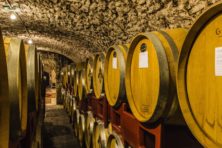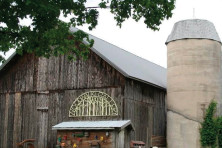Sister Bay Seeks Two More Liquor Licenses
- Share
- Tweet
- Pin
- Share
The Village of Sister Bay will try to take advantage of some new legislation that changed the quota for liquor licenses within municipalities. Wisconsin Act 286, published on March 30 but effective on June 1, made it harder for restaurants to acquire liquor licenses while giving municipalities the ability to increase their liquor license quota.
“When this came up, as a board we have to answer the question, do we want more liquor licenses in the village?” said Village Board President David Lienau.
The board, recognizing that Sister Bay has many options for dining while retail remains scarce, still agreed that they should pursue this possibility of retaining more liquor licenses for future development.
“I think it would be shortsighted for us not to move forward,” said board member Denise Bhirdo. “Maybe that can help the shoulder season and the offseason because we are open. That’s a good thing.”
“We have one of the builders on the Braun property who said it would be fantastic if we could get a liquor license in Sister Bay,” said Village Administrator Zeke Jackson, noting that two of the Braun property lots have been sold to J.J. Johnson while more are in negotiations.
The introduction of Wisconsin Act 286 was intended to provide the Village of Ashwaubenon with a way to issue more liquor licenses for businesses in the Titletown District, or the developing area just outside of Lambeau Field. Municipalities can draw a 40-acre circle around an area and call it a “premier economic development district.” That district would receive an additional two liquor licenses above the quota imposed by the state.
The idea helped offset a restriction to municipal liquor license quotas that was also included in Wisconsin Act 286. Previously, a business could apply for a liquor license if it had a 300-person seating capacity. Now, those 300 seats are required to be indoor and permanent.
The change in seating capacity is what forced the Village of Sister Bay to fast-track the liquor licenses for Al Johnson’s and Boathouse by the Bay, both of which received their liquor licenses before the effective date of Wisconsin Act 286.
Now, the village will seek more liquor licenses by drawing its own premier economic development district. But there are some criteria that must be met within those lines.
The district must be one continuous geographic area. The village must also prove there will be new construction that is valued at $20 million, determined by a third-party assessor or market research firm.
“You’ve got some third-party who is going to say, ‘We believe in these areas you will create a combined $20 million of new construction,’” said Jackson. “Can we satisfy the village’s assertion that we’re going to have $20 million of developable property there? I bet we can make that case.”
That new construction can come in the form of building plans and assumptions rather than actual valuation of bricks and mortar. Jackson said the Department of Revenue (DOR) has not laid out consequences if the $20 million in planned development does not materialize.
The village voted unanimously to continue with development of a premier economic development district, which will include costs of an estimated $15,000 in legal fees and the third-party assessment. Licenses within the district must be sold for a minimum $30,000, likely offsetting the cost to the village for implementing the district. The area will include the Braun property, but the village has not determined what other continuous parts of the village will be included.


